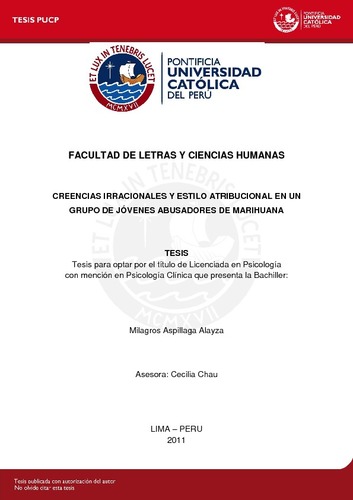| dc.contributor.advisor | Chau Pérez-Aranibar, Cecilia Beatriz | es_ES |
| dc.contributor.author | Aspillaga Alayza, Milagros | es_ES |
| dc.date.accessioned | 2013-09-12T15:43:32Z | es_ES |
| dc.date.available | 2013-09-12T15:43:32Z | es_ES |
| dc.date.created | 2011 | es_ES |
| dc.date.issued | 2013-09-12 | es_ES |
| dc.identifier.uri | http://hdl.handle.net/20.500.12404/4760 | |
| dc.description.abstract | Creencias irracionales y estilo de atribución en un grupo de jóvenes abusadores
de marihuana
Esta investigación buscó describir la presencia de creencias irracionales y estilo
atribucional en una muestra de 40 jóvenes entre 18 y 25 años, abusadores de
marihuana de la ciudad de Lima metropolitana que acudieron a un centro de
consejería y terapia motivacional. Las pruebas aplicadas fueron el Registro de
Opiniones de Ellis y la Escala de Estilo Atribucional “PASS” de Arévalo. Debido a la
falta de baremos, se procedió a describir la muestra en relación a sus características
sociodemográficas. Los resultados de la investigación no mostraron características
similares en el consumo. Asimismo no se encontraron creencias irracionales altas o
bajas, sin embargo la más próxima al punto de corte alto fue la relacionada al temor
“se debe sentir miedo o ansiedad ante lo desconocido o potencialmente peligroso”; y la
que bordeo el punto de corte bajo fue la relacionada al control “Los sucesos externos
causan la mayoría de desgracias, los sujetos sólo reacciona según cómo estos afectan
sus emociones”. El estilo atribucional sólo presentó una media elevada, encontrada en
el grado de instrucción en relación a la estabilidad. | es_ES |
| dc.description.abstract | Irrational believes and attributional style in a group of young marijuana abusers
The present described the presence of irrational believes and attribution style in a
group of 40 young marijuana abusers, aged between 18 and 25 years, from Lima
Metropolitana that attend a counseling and motivational therapy center. The tests
applied where Ellis Opinion Register and the Personal Attribution Style Scale “PASS”
by Arévalo. Due to the lack of national scales, the sample was described in regarding
it’s socio-demographic characteristics. The results didn’t show similar characteristics
regarding marijuana use. Also, high or low irrational believes weren’t found.
Nevertheless, the believe that was found nearest the high range was related to fear
“we must feel fear or anxiety to the unknown o potentially dangerous”, and the one
found nearest the low range was related to control “external factors are the main cause
of misfortunes, people just react to how they affect their emotions”. The attributional
style, only presented one elevated mean, found in the instruction level regarding the
Stability. | es_ES |
| dc.language.iso | spa | es_ES |
| dc.publisher | Pontificia Universidad Católica del Perú | es_ES |
| dc.rights | Atribución-NoComercial-SinDerivadas 2.5 Perú | * |
| dc.rights | info:eu-repo/semantics/openAccess | es_ES |
| dc.rights.uri | http://creativecommons.org/licenses/by-nc-nd/2.5/pe/ | * |
| dc.subject | Abuso de drogas--Aspectos psicológicos | es_ES |
| dc.subject | Creencia y duda | es_ES |
| dc.title | Creencias irracionales y estilo atribucional en un grupo de jóvenes abusadores de marihuana | es_ES |
| dc.type | info:eu-repo/semantics/bachelorThesis | es_ES |
| thesis.degree.name | Licenciado en Psicología Clínica | es_ES |
| thesis.degree.level | Título Profesional | es_ES |
| thesis.degree.grantor | Pontificia Universidad Católica del Perú. Facultad de Letras y Ciencias Humanas. | es_ES |
| thesis.degree.discipline | Psicología Clínica | es_ES |
| renati.discipline | 313026 | es_ES |
| renati.level | https://purl.org/pe-repo/renati/level#tituloProfesional | es_ES |
| renati.type | http://purl.org/pe-repo/renati/type#tesis | es_ES |
| dc.publisher.country | PE | es_ES |
| dc.subject.ocde | https://purl.org/pe-repo/ocde/ford#5.01.00 | es_ES |






